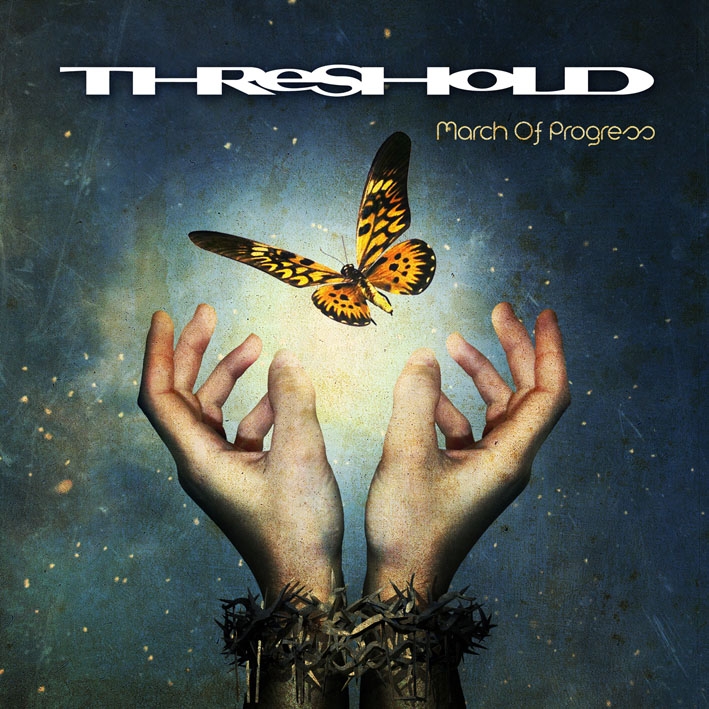
Album Review: Threshold - March Of Progress
The path a band takes is rarely a straight line. Detours pop up that throw into upheaval whatever momentum can be gained, making a career as much a test of endurance as it is a measure of the quality of work produced. It would be nice to think circumstances that fall out of our control wouldn't have such an impact on where life takes us, but we are not given that luxury. Bands are subject to the whims of fate as much as anyone else, and while some are blessed with good timing, others find themselves stuck with the blackest kind of luck.
Threshold was on the right track when we last heard from them. “Dead Reckoning” was not just a well received album, it was a minor masterpiece in the modern progressive metal world, the kind of album that offered up everything that could be wanted in the genre. A perfect blend of heavy riffs, undeniable melodies, and even the modern inclusion of well-placed death growls accenting a couple of songs, the album was poised to move Threshold into the stature fans say they should have been enjoying all along. They were no longer trailing their peers in terms of the records they were making, they were as good as anyone.
Fate, as it is wont to do, intervened. Singer Andrew “Mac” McDermott, a key part in making “Dead Reckoning” the success it was, left the band following the release, passing away from kidney failure not long after his departure. Changing a singer is always a dicey proposition for a band, but especially under such unfortunate circumstances. Making a record with a new singer, making a record after putting out such a strong album, and making a new album in the shadow of a fallen member, combined are the kind of pressure and situation that would easily excuse a less than stellar outing.
“March Of Progress” is not its predecessor, and not merely because of the change behind the mic. Damian Wilson returns to the band he once fronted, fifteen years after his last appearance. Having appeared with Star One and this year's Headspace album, his profile is higher than during his first stint with the band. He is maybe the only singer who could step in on this album without drawing constant comparisons to Mac. Wilson's voice has a bit of the love it or hate it tone that marks many progressive singers, especially those with theatrical ties or deliveries. He is not a classic metal singer, which makes him sound awkward in some of the heavier passages, but allows for more emotional resonance in the softer moments.
The doubts about whether Threshold could continue on are cast aside immediately, as “Ashes” bursts forth in a wave of pulsing riffs and trademark melodies. Their approach to progressive metal is compositional, not technical, marrying simpler instrumentation with some of the best melodies in all of progressive metal in an intelligent manner. “Ashes” is a perfect bridge from the previous era to this new dawning of the band, a supremely catchy song that recalls the feeling of “Dead Reckoning”, and is the best of all worlds.
“Return Of The Thought Police” moves the band forward, grinding out maybe the heaviest riff Threshold has ever penned, as Wilson wrings as much emotion as he can from his voice in the quiet verses that sit between the metal borders. The chorus is restrained, and sheds the traces of pop from the opener, ably fitting the tenor of the track. “Staring At The Sun” takes the opposite approach, with a compact running time and a massive chorus perfectly suited for being belted out live.
The middle of the album can't continue at the same clip, dialing back the songs just enough to make them feel sluggish. “Liberty Complacency Dependency” is a slow burn that fails to ignite, while “Colophon” and “The Hours” try their best to kick into gear, but can't turn over the engine when they want to. After the opening salvo, these come as a shock, giving away the momentum the start of the album built, wasting what could have been.
“Don't Look Down” is a more expansive number that threatens to travel down the same track, running through what feels like a pedestrian chorus before the guitars keep building and another section of the song continues on, anchoring the song with a better melody. The fake-out isn't a bad trick of songwriting, but comes along at the wrong time, making the run of less impressive songs seem more an intentional decision than a lack of worthwhile ideas. The band tosses in another impressive bridge section, further rendering the middle of the album second-tier material.
What's striking about “March Of Progress” is that for a progressive band, it's the more expansive songs that make the least impact. The opening trio, along with the relatively shorter “Coda” are the most immediate, and ultimately most satisfying songs. The longer works have their moments, but get lost along the way, trading tight songcraft for the number of ideas in each song.
It would be unfair to place the blame for the album's shortcomings on Wilson, even though he is the only change from “Dead Reckoning”. The songwriting core is the same, but lacks the focus and knack for filling even the grandiose moments with abundant melodies. “March Of Progress” is a more progressive album, but it's not a better one. It has more ambition than “Dead Reckoning” did, and Wilson does an admirable job of stepping into an unfortunate position, but the end result doesn't come together the way it should. “Dead Reckoning” felt like the beginning of something great, and “March Of Progress” is not a step forward from that point. It's not a huge step backward, but it is one, and even though it is a good record when judged on its own merit, it's hard not to consider it a mild disappointment.

